Causes of Kawasaki Disease
Like all autoimmune diseases, the cause of Kawasaki disease is presumably the interaction of genetic and environmental factors, possibly including an infection. The specific cause is unknown, but current theories center primarily on immunological causes for the disease. Evidence increasingly points to an infectious etiology but debate continues on whether the cause is a conventional antigenic substance or a superantigen. Superantigen (An antigen of viral or bacterial origin? an unconventional protein leads to massive T cell activation leads to cytokines production, Ab against endothelial cell ligands.Children's Hospital Boston reports that "some studies have found associations between the occurrence of Kawasaki disease and recent exposure to carpet cleaning or residence near a body of stagnant water; however, cause and effect have not been established."
An association has been identified with a SNP in the ITPKC gene, which codes an enzyme that negatively regulates T-cell activation. An additional factor that suggests genetic susceptibility is the fact that regardless of where they are living, Japanese children are more likely than other children to contract the disease. The HLA-B51 serotype has been found to be associated with endemic instances of the disease.
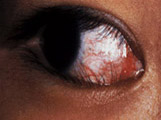
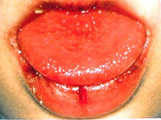
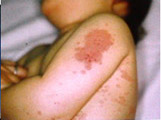
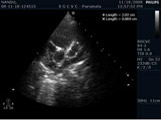
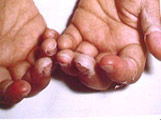
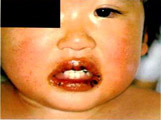
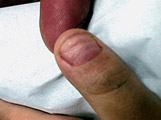
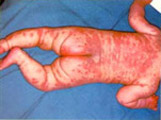
An association has been identified with a SNP in the ITPKC gene, which codes an enzyme that negatively regulates T-cell activation. An additional factor that suggests genetic susceptibility is the fact that regardless of where they are living, Japanese children are more likely than other children to contract the disease. The HLA-B51 serotype has been found to be associated with endemic instances of the disease.
SIGNS OF KAWASAKI DISEASE

Reddening of the eyes

Reddening of lips & strawberrytongue

Redness at the site of BCG inoculation

Coronary aneurysm in KD

Membranous Desquamation Convalescent Stage

Changes of lips & congestionof ocular conjunctivae

Beaus Line on Nail

Exanthema of Kawasaki Disease






